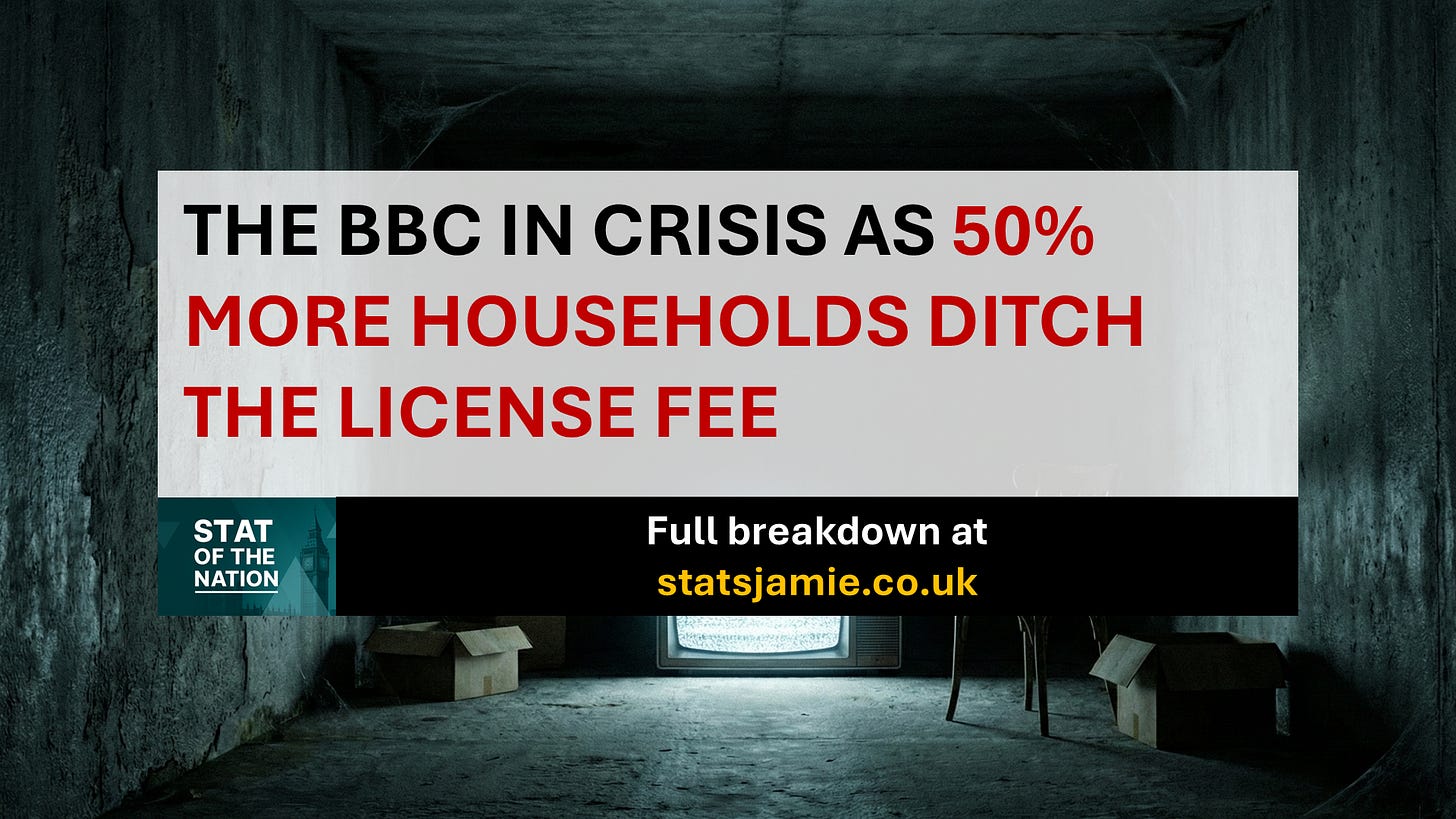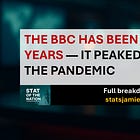The BBC in Crisis as 50% More Households Ditch the Licence Fee
Britain is switching off — and the BBC can’t stop the exodus
The Director-General has gone. Senior news bosses have resigned. And behind the headlines, years of financial decline and collapsing public confidence have finally caught up with the BBC.
We’re often told the Corporation is “the envy of the world.” But this week, it looks more like an institution losing its authority, its audience — and its ability to fund itself.
A new report from the Public Accounts Committee, the group of MPs that holds public bodies accountable for every pound they spend, makes grim reading for the BBC. The Trump-footage scandal is the spark, but the PAC’s findings show the fire has been burning for years.
💸 The £1.1 Billion Black Hole
The BBC is now losing more than £1.1 billion a year through evasion and opt-outs. This isn’t a minor leak — it’s a financial crisis deeper than anything the BBC has faced in decades.
Evasion has risen to 12.5%, meaning one in eight people who use BBC services don’t pay for them. At the same time, 3.6 million households have declared they “do not need” a licence — a number that has jumped 50% since 2020/21 and continues climbing.
The PAC spells it out: the funding model isn’t under pressure — it’s breaking apart.
🏃♂️ The Exodus: Millions Opting Out — and Not Coming Back
The most telling trend isn’t evasion — it’s the mass opt-out movement. These households haven’t stopped paying by accident; they’ve actively told the BBC they don’t use the service.
In 2021, 2.4 million households opted out. Today, it’s 3.6 million. Once people leave for streaming services, they rarely return to linear broadcast television. That’s the BBC’s real long-term problem: this isn’t a temporary dip — it’s a generational shift in behaviour.
The BBC isn’t just losing money. It’s losing the public.
📉 The Collapse of the Shared Audience — From 30 Million to Just a Few
There was a time when the BBC united the country. In the 1980s, more than 30 million people tuned in to watch Den hand Angie divorce papers in EastEnders. The Only Fools and Horses Christmas specials regularly pulled in 20–25 million viewers — true national events.
Today, a flagship BBC show might draw 3–5 million. Even the hugely successful Gavin & Stacey Christmas special reached around 12 million — a strong number by modern standards, but still nowhere near the mass shared audiences of the past.
The talent that once made the BBC unmissable now works across platforms — Netflix one year, ITV the next, Amazon the year after. Viewers have more choice than ever, and the BBC is simply one option among dozens.
For a funding model built on universality, that fragmentation is fatal.
🚪 “The Ground Is Shifting” — Enforcement Is Failing
To stem the losses, the BBC has leaned harder on enforcement: more letters, more visits, more inspections. But the PAC reveals a strategy that no longer works.
Enforcement officers carried out 2 million home visits last year — a 50% increase — yet prosecutions still fell 17%. The BBC openly admits it has become “harder to get people to answer their doors.”
The PAC Chair warned bluntly: “The ground is shifting beneath the BBC’s feet.”
You can’t enforce a 20th-century funding system on a population that lives online.
📮 A Paper-Based System in a Streaming World
Despite describing itself as a digital broadcaster, the BBC still runs its licence fee operation like it’s 1993.
Around 40% of all TV licences are still issued on paper, and the BBC has no target to increase digital uptake. Meanwhile, its major IT upgrade with Capita is almost two years late, with several milestones still incomplete.
Netflix uses algorithms. The BBC uses envelopes.
⚠️ A Crisis of Trust at the Worst Possible Moment
Trust is the foundation of a compulsory funding model — and trust is falling.
Only half of 16–34-year-olds feel the BBC reflects them. Younger audiences are tuning out, drifting to YouTube, TikTok, and streaming platforms where content is personalised, on-demand, and ad-free. The Trump footage scandal hits at the exact moment the BBC needs goodwill more than ever.
When trust goes, the licence fee goes with it.
📺 The Market Has Moved On — The BBC Hasn’t
Every major competitor uses one of two models:
subscriptions,
advertising.
No inspectors. No legal letters. No criminal offences.
Meanwhile, the BBC ties payment to a physical address, not to actual usage. This hybrid broadcast-plus-digital model no longer aligns with how people consume media.
The world has moved on. The BBC hasn’t.
🔚 Conclusion: A Model in Freefall
The BBC is now losing on every front:
Financially — a £1.1bn hole that grows every year.
Operationally — enforcement failing, digital modernisation stalling.
Reputationally — trust falling, scandals rising, leaders resigning.
The PAC calls the BBC “an organisation under severe pressure.”
That’s putting it politely.
The money is going. The audience is going. The trust is going.
And unless something radical changes, the BBC’s funding model won’t just be outdated — it will be unsustainable.
✍️ Jamie Jenkins
Stats Jamie | Stats, Facts & Opinions
📢 Call to Action
If this helped cut through the noise, share it and subscribe free at statsjamie.co.uk — get the stats before the spin, straight to your inbox (no algorithms).
📚 If you found this useful, you might also want to read:
📲 Follow me here for more daily updates:




Just had another letter from the TV licencing lot today. Apparently it is not enough to tell the them once that you have zero desire to watch any of the propaganda that they spout. You are supposed to keep telling them and if you don't, they assume you must be lying and threaten to send someone round to the house to check. It is a bit like the police saying they will come round and check I am not running an illegal gambling ring or selling drugs just on the off chance that I might be, without any evidence whatsoever. Do they really think people actually want to watch it?
I stopped paying in June 2020, right after I came out of a very empty hospital. As I paid annually I demanded a refund for June up to December and got it. I told them I wasn't paying to listen to their convid propaganda any more.